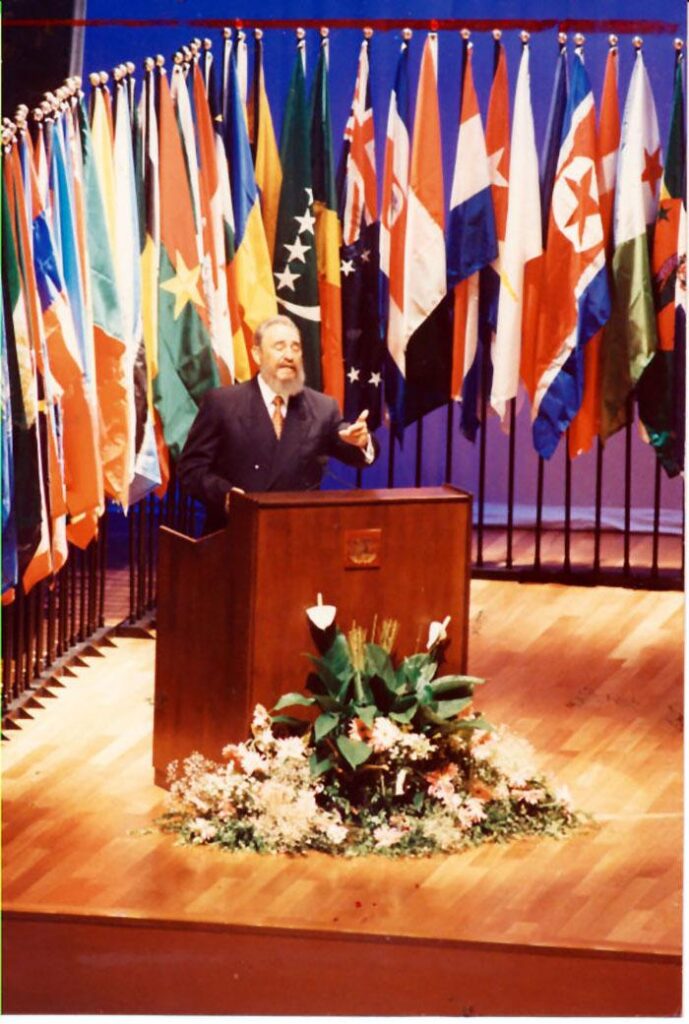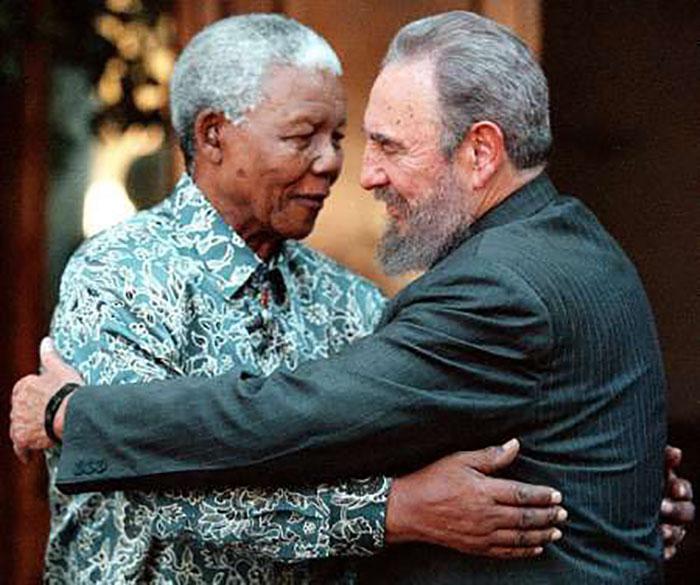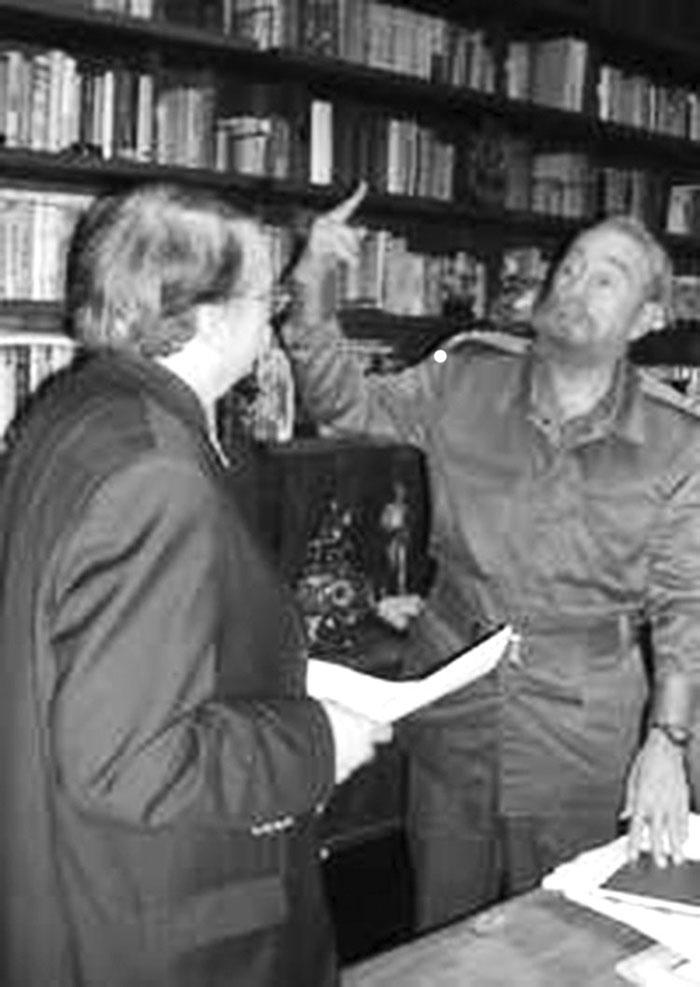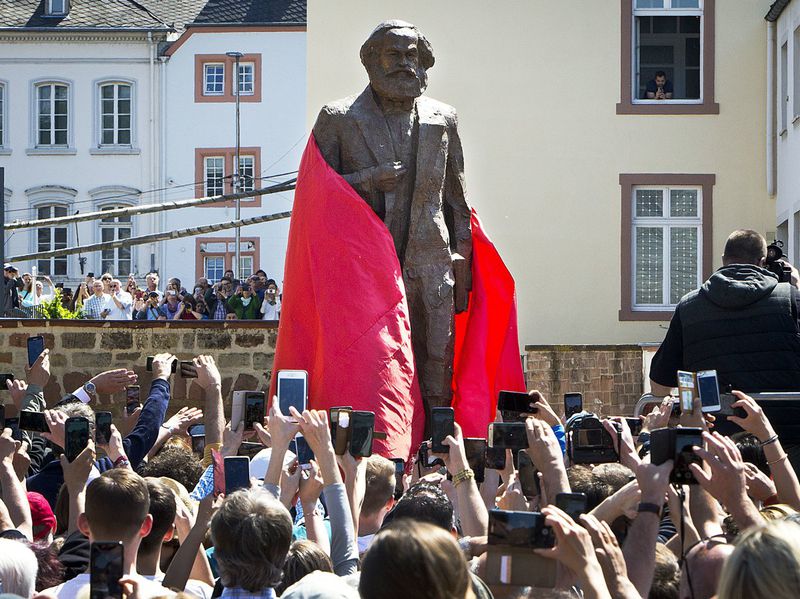Few people have known the glory of entering into the realm of legend and history during their lifetime. Fidel is one of these people
Fidel is dead, but he is immortal. Few people have known the glory of entering into the realm of legend and history during their lifetime. Fidel is one of these people. He belonged to a generation of legendary fighters – Nelson Mandela, Patrice Lumumba, Amílcar Cabral, Che Guevara, Camilo Torres, Turcios Lima, Ahmed Ben Barka – who, in pursuit of an ideal of justice, threw themselves into political action in the 1950s, with the aim and the hope of changing an unequal, discriminatory world, marked by the onset of the Cold War between the Soviet Union and United States.

During that period, people across half of the world, in Vietnam, Algeria, Guinea-Bissau, were rising up. At that time, a large part of humanity was still under infamous colonial rule. Almost all of Africa and a good part of Asia were dominated, subjugated, by the old empires of the West. Meanwhile, Latin American nations, which had theoretically achieved independence over a century and a half before, continued to be exploited by privileged minorities, subjected to social and ethnic discrimination, and often marked by harsh dictatorships, backed by Washington.
Fidel bore the onslaught of no less than 10 U.S. Presidents (Eisenhower, Kennedy, Johnson, Nixon, Ford, Carter, Reagan, Bush Senior, Clinton and Bush Junior) and maintained relations with some of the world’s most important post-WWII leaders (Nehru, Nasser, Tito, Khrushchev, Olaf Palme, Ben Bella, Boumedienne, Arafat, Indira Gandhi, Salvador Allende, Brezhnev, Gorbachev, François Mitterrand, Juan Pablo II, King Juan Carlos, etcetera). He also met some of the most prominent intellectuals and artists of the time (Jean-Paul Sartre, Simone de Beauvoir, Arthur Miller, Pablo Neruda, Jorge Amado, Rafael Alberti, Guayasamin, Cartier-Bresson, José Saramago, Gabriel García Márquez, Eduardo Galeano, Noam Chomsky, etc.)

Under his leadership, the small island of Cuba (100,000 square kilometers, with a population of 11 million) was able to carry out a powerful project on a global scale, even defying the United States, whose leaders were never able to overthrow, stop, or change the course of the Cuban Revolution.
In December 2014, the U.S. was finally obliged to admit political defeat and the failure of their anti-Cuban policies, and initiate a process to move toward the normalization of relations, which included respecting Cuba’s political system.
In October of 1962, WWIII was about to erupt, owing to U.S. opposition to the installation of Soviet nuclear missiles in Cuba, destined above all to prevent another military attack, like the one that took place at Playa Girón (the Bay of Pigs), or any other direct action by the U.S. armed forces to overthrow the Cuban Revolution.
Washington has imposed a devastating trade embargo (blockade) on Cuba for over 50 years (despite the reestablishment of diplomatic relations) – which was tightened in the 1990s through the Helms-Burton and Torricelli Acts – hindering the normal economic development of the county, with tragic consequences for its citizens. What is more, Washington continues to conduct a relentless ideological and media war against Havana, using powerful tools such as Radio Martí and TV Martí, based in Florida, to inundate Cuba with subversive propaganda, just like it did during the worst moments of the Cold War.

Meanwhile, various terrorist organizations – Alpha 66 and Omega 7 -, hostile to the Cuban regime, and with the passive complicity of U.S. authorities, set up training camps in Florida from where they regularly sent armed commandos to carry out attacks. Cuba is one of the countries to have suffered the most terrorist attacks and has the highest rate of associated victims (some 3,500 deaths) over the last 60 years.
In the face of these relentless attacks, the island’s authorities have prescribed, in domestic affairs, total and unquestioned unity; applying in their own way the old motto by San Ignacio de Loyola: “In a besieged fortress, any dissent is tantamount to treason.”
However, throughout his life and up until his death, a personality cult never developed around Fidel. No official portrait, statue, stamp, coin, street, building, monument bearing his name, or that of any of the Revolutionary leaders still alive today, has ever been erected.
Cuba a small country committed to maintaining its sovereignty, has attained, under the leadership of Fidel, and despite unrelenting foreign aggression, exceptional results in the field of human development, including the abolition of racist segregation; women’s rights; the eradication of illiteracy; a drastic reduction in infant morality rates; and a general increase in educational and cultural standards… In regards to education, health, medical research and sports, Cuba has achieved levels of excellence that rival those of the most advanced nations.
The island continues to take an active approach to diplomacy worldwide. Havana, in the 1960s and 70s supported guerilla struggles in many Central (El Salvador, Guatemala, Nicaragua) and South American (Colombia, Venezuela, Bolivia, Argentina) countries. Cuba’s armed forces have participated in historic military campaigns, above all in wars in Ethiopia and Angola. Its intervention in the latter led to the defeat of the South Africa’s elite troops, thus accelerating the fall of the racist apartheid regime.
Today, the Cuban Revolution, inspired and led by Fidel Castro, continues to be, thanks to his accomplishments and despite his shortcomings, an important reference for millions of marginalized people around the world. Here or there, in Latin America and other parts of the world, women and men are protesting, struggling and even dying in attempts to set up social systems inspired by the Cuban model.
The fall of the Berlin wall in 1989, the disappearance of the Soviet Union in 1991, and the historic failure of state socialism did nothing to alter Fidel Castro’s dream of establishing a new kind of society in Cuba, a more just, healthier, better educated one, with no exclusivity or any kind of discrimination, and knowledge of the entire world.
Right up until the eve of his death, at 90 years of age, Fidel continued to actively work to defend the environment, and denounce neoliberal globalization; he fought in the trenches, on the front line, leading the battle for the ideas in which he believed, and no one or nothing could make him renounce.
Whether his critics like it or not, there is a place reserved for Fidel Castro in the global pantheon, devoted to those who fought the hardest for social justice and offered the most solidarity in support of the oppressed of the Earth.
I met Fidel in 1975 and spoke with him on many occasions over the years, always in very professional and specific circumstances, while reporting on the island or participating in some congress or event.
When we decided to write the book One Hundred Hours with Fidel, he invited me to accompany him over several days, while he undertook various activities both in Cuba (Santiago, Holguín, Havana) and abroad (Ecuador).
We talked at length in the car, on the plane, while walking about, eating lunch or dinner; all off-camera. We discussed everything, the daily news, his past experiences, and present concerns, which I would later write down, from memory, in my notebooks. Later, we saw each other often, for at least several days, and once for four months, over about three years.
That’s how I discovered a more intimate side of Fidel; almost shy, very polite, who would listen intently to every speaker. He was always considerate of others, and especially his associates. I never heard him shout, or give an order. With the cordial manners and gestures of a bygone era, he was a complete gentleman with a strong sense of honor. A man who, from what I could see, lived like a Spartan, with basic furniture, healthy food, and few expenses, adopting a lifestyle like that of a nun or solider.
His work day ended at six or seven in the morning, as the day was just beginning. On more than one occasion he interrupted our conversation at two or 3am, because he needed to attend an “important meeting”… He would only sleep for four hours, and sometimes one or two more during the day.
He was a night owl and tireless. Trips, deployments, meetings were all incessantly combined at an astonishing rate. At the end of the day his aides – all young, brilliant, and around 30 years of age – were all worn out. They would sleep on their feet, exhausted, unable to keep up with this tireless giant’s pace.
Fidel demanded letters, reports, cables, news, statistics, summaries of radio and television broadcasts, telephone calls…He never stopped thinking, pondering. Always alert, ready, leading a small staff – composed of his aides and helpers – waging a new battle. A man of ideas, always thinking the unthinkable, imagining the unimaginable, with an astonishing mental capacity.
Once a project was decided, nothing could stop it; it would be fulfilled. “The quartermaster will follow,” as Napoleon said. Fidel just the same, his enthusiasm inspired unity, raised morale. Almost like magic his ideas would start to materialize, become real actions, objects, events.
His speaking ability, so often described, was remarkable, phenomenal. I’m not talking about his famous public speeches, but about a simple conversation at a table. Fidel was a torrent of words, an avalanche, which accompanied the extraordinary gestures made by his fine hands.
He liked precision, accuracy, punctuality. With him, everything had to be exact. An extraordinary memory, unheard of, outstanding precision, so rich that at times it seemed to prevent him from thinking succinctly. His ideas were arborescent; everything was linked, everything was related. Constant digressions, permanent parentheses. Speaking about one issue would lead to a link, recall a detail, situation or figure, a parallel issue, and another, and another, and another, all the while moving further and further away from the central issue, so much so that the other person would fear for a moment that they had lost the thread of the conversation. But then he would retrace his steps, and return again, with astonishing ease, to the main idea.
At no time during our more than 100 hours of conversations did Fidel put a limit on any of the questions we discussed. Given the considerable intellectual that he was, debate didn’t scare him. On the contrary, he needed it, it stimulated him; permanently ready to deliberate with anyone, but always with great respect and care. He was a fearsome debater andpolemicist, with an abundance of arguments, a man only repulsed by duplicity and hate. (http://www.jornada.unam.mx)
Author: Ignacio Ramonet | internet@granma.cu
december 28, 2016 12:12:00
http://en.granma.cu/hasta-la-victoria-siempre/2016-12-28/the-fidel-i-knew

